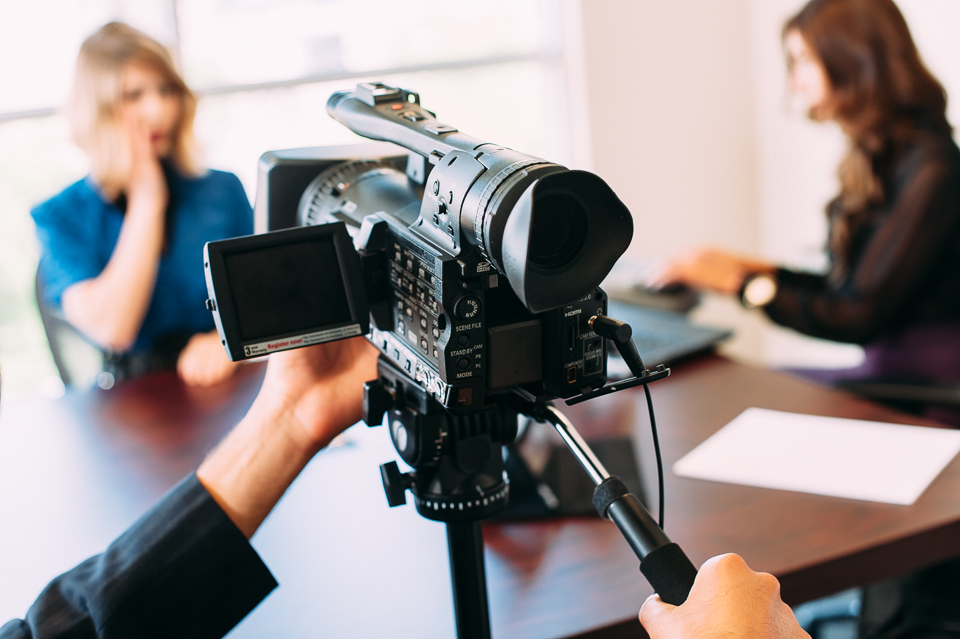The Importance of Legal Video Depositions in Modern Legal Solutions: What You Need to Know
Legal video clip depositions have ended up being necessary in today's lawful landscape. They provide a multidimensional view of witness testimonies that conventional transcripts just can not match. By recording both verbal and non-verbal interaction, these depositions enhance the general understanding of a witness's reliability. Nevertheless, the efficiency of video clip depositions depends upon various variables, consisting of conformity with lawful standards and ideal techniques (legal video depositions). Checking out these components discloses their true relevance in modern lawful solutions
What Are Lawful Video Depositions?
Lawful video clip depositions act as an essential device in the litigation procedure. They entail videotaping witness testaments in a video style, catching both spoken and non-verbal interaction. This method allows attorneys to document the behavior, expressions, and responses of witnesses, providing a richer context for the statement. Commonly carried out in a controlled atmosphere, these depositions are led by attorneys who ask inquiries while a stenotype reporter records the dialogue. The resulting video can be crucial for trial preparation, as it makes it possible for legal representatives to evaluate the trustworthiness of witnesses and improve their techniques. Furthermore, legal video clip depositions can be made use of in numerous legal contexts, ranging from civil conflicts to criminal situations. The auditory and aesthetic components of video depositions improve the presentation of evidence, making it a crucial part in the modern-day lawful landscape. Overall, they add significantly to the efficiency and efficiency of lawful procedures.

Advantages of Video Depositions Over Traditional Methods
Video clip depositions provide many advantages contrasted to conventional approaches of taking witness testaments. One substantial advantage is the capacity to record both audio and visual components, supplying an extra detailed record of the witness's declarations. This double style improves clarity and permits lawyers to reference details nuances throughout trial prep work. In addition, video depositions help with remote engagement, making it much easier for witnesses that may be not available for in-person appearances as a result of geographical constraints or health and wellness issues.Moreover, video clip depositions can expedite the overall deposition procedure, minimizing the time and costs related to traveling and logistics. They additionally boost access, as taped depositions can be quickly shared amongst legal groups and referenced any time. This comfort adds to much better instance management and prep work. In general, video clip depositions represent a contemporary, effective approach to gathering witness testaments, lining up with the advancing requirements of the lawful profession.
The Role of Body Movement and Tone in Testimonies

In legal video clip depositions, body movement and tone play important duties in conveying a witness's credibility and credibility. Nonverbal signs can offer insights into a witness's emotion, influencing how their testament is perceived. Recognizing the impact of these aspects is crucial for jurors and lawyers alike when reviewing the reliability of a testimony.
Nonverbal Interaction Insights
While spoken communication is commonly highlighted in lawful testaments, nonverbal signs such as body language and tone play a necessary duty in conveying trustworthiness and feeling. Viewers of depositions may note that a witness's stance, motions, and faces can substantially affect understandings of integrity. Regular eye call might indicate confidence, while preventing look can recommend deceit or discomfort. In a similar way, the intonation-- its quantity, pitch, and pace-- can pass on feelings of sincerity or unpredictability. Lawyers must be attuned to these nonverbal signals, as they frequently give crucial context that complements spoken words. Comprehending these nuances can improve the efficiency of depositions and influence the result of legal process.
Psychological Tone Influence
The emotional tone communicated during legal testaments greatly affects how a witness is viewed. Body language, singing inflections, and facial expressions play essential roles in shaping the story of a testament. A witness exhibiting confidence via stable eye call and a calm tone can infuse a feeling of integrity and engagement. On the other hand, indications of anxiousness, such as fidgeting or an unsteady voice, may bring about hesitation regarding their account. The subtleties of emotional expression can affect the interpretation of realities, making it vital for lawful experts to acknowledge these hints. In video depositions, the acoustic and aesthetic components incorporate, emphasizing the significance of psychological tone in sharing genuineness and truthfulness within the legal procedure.
Reliability and Dependability
An important element in developing integrity and credibility throughout testaments depends on the witness's body movement and tone of voice. Onlookers typically count on non-verbal signs-- such as eye call, stance, and motions-- to analyze a witness's sincerity. For example, a witness who preserves eye call and shows open body movement might be regarded as more honest and dependable than one who prevents eye call or shows up shut off. Additionally, tone of voice plays a crucial duty; a consistent, tranquil tone can strengthen the integrity of the testimony, while variations in pitch or quantity may raise doubts. Inevitably, the combination of body language and singing tone substantially influences how a witness's statements are gotten and interpreted in a lawful context.
Ideal Practices for Conducting Video Depositions
Conducting video depositions calls for mindful preparation and execution to assure a clear and efficient presentation of testimony. Initially, it is very important to pick a peaceful, well-lit area to minimize interruptions and safe ideal video quality. click over here The devices must be examined ahead of time, consisting of electronic cameras, microphones, and lights, to avoid technical problems throughout the deposition.Next, parties included need to evaluate the layout and treatments ahead of time, making sure that every person recognizes their duties. The deponent must be oriented on the process, consisting of just how to respond plainly and concisely.Additionally, keeping a specialist temperament throughout the session is crucial. This the original source includes refraining from talking over one another and confirming that all inquiries are directed suitably. Lastly, it is vital to tape the deposition in a format that permits very easy playback and evaluation, preserving the honesty of the statement for future usage.
Lawful Factors To Consider and Compliance Issues
Just how do legal considerations and conformity problems influence the effectiveness of video clip depositions? Legal specialists must navigate an intricate landscape of policies, ensuring that video depositions stick to administrative guidelines and criteria. Compliance with regulations concerning privacy, authorization, and recording approaches is vital. For example, getting specific permission from all events included is needed to avoid legal repercussions.Additionally, the admissibility of video evidence in court can pivot on compliance with procedural needs. Guaranteeing that the devices utilized fulfills technological standards is likewise important, as low quality can weaken the deposition's reliability.Moreover, attorneys should recognize any specific state legislations that govern video depositions, as these can differ considerably. Failure to address these factors to consider can not just jeopardize the integrity of the deposition however likewise impact the overall case technique, ultimately affecting the customer's lawful outcomes.
How Video Depositions Effect Jury Understanding
While video depositions can function as effective devices in legal procedures, their influence on jury understanding is significant. The aesthetic and acoustic aspects of video clip recordings supply jurors with a much more detailed understanding of witness temperament, credibility, and psychological actions. This multimedia method can improve the jurors' ability to analyze the reliability of statement contrasted to standard text-based transcripts.Moreover, video clip depositions permit jurors to observe body movement, intonation, and facial expressions, every one of which can influence their interpretation of the witness's declarations. The visibility of a witness on display can humanize them, fostering compassion and connection, which may guide jurors' opinions. Conversely, a witness that shows up incredibly elusive or undependable on video might cause unfavorable perceptions that influence a court's choice. Inevitably, the vibrant nature of video depositions plays an important duty in forming just how jurors translate proof and reach their verdicts.
The Future of Video Clip Depositions in Legal Technique
As improvements in modern technology continue to improve the legal landscape, the future of video clip depositions is positioned for significant development. Technologies such as synthetic intelligence, digital truth, and find out here enhanced video clip conferencing devices are anticipated to enhance the deposition process and improve ease of access. Lawful experts may use AI-driven analytics to examine witness integrity and case toughness more effectively.Moreover, the integration of virtual truth could enable courts to experience immersive simulations of depositions, offering much deeper context and understanding. Additionally, the fad toward remote depositions is most likely to linger, supplying better adaptability for attorneys and customers alike.As remote job comes to be significantly normalized, video clip depositions will likely become typical method, reducing prices and time restrictions related to standard techniques. In general, these technical innovations guarantee to boost the efficiency, performance, and access of video clip depositions in lawful method, inevitably transforming how attorneys prepare for trial.
Regularly Asked Inquiries
Just How Much Do Legal Video Clip Depositions Normally Price?

Can Video Depositions Be Used in Any Type Of Kind of Case?
Video clip depositions can be used in different kinds of situations, consisting of civil, criminal, and household legislation. Their adaptability permits lawyers to present witness testaments efficiently, adapting to the certain needs of different legal situations.
What Tools Is Needed for a Video Deposition?
To carry out a video deposition, important devices consists of a high-grade camera, microphone, lighting, and a dependable recording device. Furthermore, a computer with editing software program might be necessary for post-production and formatting the last video clip.
How much time Does a Normal Video Clip Deposition Last?
A common video deposition lasts in between 2 to four hours, depending upon the complexity of the situation and the variety of concerns presented. Extended sessions may take place, however breaks are usually integrated for participant convenience.

Are Video Clip Depositions Admissible in Court?
Video clip depositions are typically admissible in court, provided they adhere to legal standards and guidelines of proof. Their usage boosts quality and preserves witness testimony, aiding in the judicial process during trials and hearings. Legal video depositions have actually come to be important in today's lawful landscape. Additionally, legal video depositions can be used in different legal contexts, varying from civil disagreements to criminal cases. In addition, video clip depositions facilitate remote engagement, making it simpler for witnesses that may be not available for in-person appearances due to geographical restraints or health and wellness issues.Moreover, video depositions can speed up the general deposition process, minimizing the time and prices associated with traveling and logistics. Making sure that the devices made use of satisfies technical standards is likewise essential, as inadequate high quality can threaten the deposition's reliability.Moreover, attorneys should be aware of any kind of specific state regulations that govern video clip depositions, as these can differ significantly. In addition, the pattern towards remote depositions is likely to continue, using better adaptability for attorneys and clients alike.As remote work becomes progressively stabilized, video depositions will likely come to be common technique, reducing prices and time restrictions associated with typical approaches.